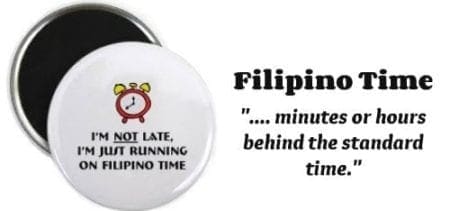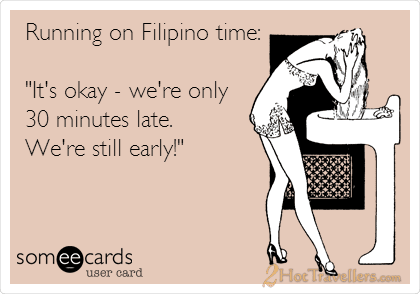We must stop upholding hurtful, toxic Filipino Habits as simply ‘part of the culture’ and begin actively resisting them in order to break the cycle.
Habits are hard to break, and many people who have them are not even aware they possess them. No matter what kind of nationality you are, we encounter toxic bad habits everywhere. We read them on social media, in the comments section of a popular posts on Facebook, Instagram, Twitter, Youtube, and even on a blog site.
 Oftentimes they are pretty irritating and annoying – our bad habits don’t seem to change for the better. We must admit we could also be guilty of having any of them. Yes, every nationality has toxic bad habits, but why pick on them? We should be more concerned about what’s going on in our lives than other people’s life.
Oftentimes they are pretty irritating and annoying – our bad habits don’t seem to change for the better. We must admit we could also be guilty of having any of them. Yes, every nationality has toxic bad habits, but why pick on them? We should be more concerned about what’s going on in our lives than other people’s life.
Toxic Filipino Habits – Like other nationalities, Filipinos have good habits too. We are known to be hospitable, resilient, creative, and many more. We’ve all been looking at the good side, however, its negative side, wouldn’t gradually disappear just because we try to ignore it. Time couldn’t heal this wound, if anything, time worsened it. Years would pass by and some may have been living and complaining about the same problem however, no action has been made. Yes, Filipino toxic bad habits earn us a negative reputation and paint the country in a bad light.
Having to witness these toxic attitudes is one of life’s greatest challenges. It’s like you want to correct one’s toxicity but if the person itself wouldn’t cooperate, the words heard would only enter one ear and exit the other. You may agree or disagree with me, but I believe that bad habits are overcoming good habits among Filipinos. And in order to make our country develop and if we really want to improve ourselves, we have to break our own bad habits.
The root of this toxic culture is within ourselves and slowly, some are trying to realize it. We need to open our minds- not by just a few individuals but by numbers growing exponentially.
TOP 5 Toxic Filipino Habits
If you feel offended reading any of this, maybe you fall into this segment of society that needs improvement in attitude and outlook in life. If not, then for you.
1. Crab mentality or Talangka System
The Crab Mentality is this: ”IF I CAN’T GET OUT, NO ONE CAN!”
We, Filipinos are said to have a crab mentality or Talangka trait, I will definitely include myself because I am a Filipina. And if you’re a Filipino reading this, come on, don’t be ashamed to admit it. With human behavior, we have these types of people in society who have the same mindset as well.
 There are some of us Filipinos who got a bitter view of the competition — that “if I cannot have it, neither can you”. When someone is on top of them, the first thought they would have is how to bring that person down, spreading fake news or rumors about the successful person to ruin his reputation.
There are some of us Filipinos who got a bitter view of the competition — that “if I cannot have it, neither can you”. When someone is on top of them, the first thought they would have is how to bring that person down, spreading fake news or rumors about the successful person to ruin his reputation.
Because of their “crab mentality”, they believe that it is not fair to them that you have freed yourself and enjoy your life when they are still struggling. So, they believe that you should struggle too!
There are a lot of them in the world of stuttering, they will mentally and verbally make attempts to bring you back down to their level! They like to discourage them from taking great opportunities, or destroying their image. It is their way of deviating people’s attention to their inadequacy by focusing on other people’s faults. Instead of doing things that could help one to develop and become better than his competitors, Filipinos devote so much of their time to gossiping and back-biting.
Most likely a person who has this mentality feels envy for the success of others instead of being happy for him. They do not want to see you succeed, so climb out of their stuttering bucket and live stutter-free! Stay away from ignorant and misinformed friends, relatives, and other advisers! Never discuss topics of stuttering and speech with them. Stay away from people with a crab mentality! Understand, that they want you to fail, drop back to stuttering, and continue to suffer together with them in the “stuttering bucket.
We should realize that the success of each Filipino will contribute to the improvement of the country, and this can help all of us to be successful as well.
2. “Mañana Habit” or Procrastination
The ‘Mañana habit,’ synonymous with the Filipino expression “Mamaya na,” is just another term for procrastination. This is the toxic Filipino habit of leaving for tomorrow what can be done today. They tend to postpone their actions for a later time thus reducing accomplishments.
Say things like “I’ll start on Monday” or “It can wait for a few more days,” and wait until the right time comes before they start to exercise and eat clean.
But when are you ever really ready? Are you really going to wait until you “feel like it?”
This arises from a slack mentality that a problem will eventually go away by itself. Also, this applies to all sorts of things but it can also affect your health.
Toxic Filipino Habits
3. Filipino Time
‘Related to the mañana habit, Filipino time refers to the Filipinos’ own unique brand of time, which is known to be minutes or hours behind the scheduled or standard time. Sounds familiar?
Don’t get it twisted as I’m also a statistic! Being married to Australian and an organizer myself, the time became more precious. It was just a matter of discipline for me.
In short, we can drop this attitude like a bad habit! Why? Well… For a simple reason. This behavior drives time-observant foreigners to get frustrated because Filipinos tend not to observe punctuality at all.
It’s a dreadful habit that needs to be stopped as it hinders productivity and progress. Not to mention that you’re not only wasting your own time but other people’s time as well.
Now, if you think the phenomenon of Filipino time was something everyone else made up to shame constant latecomers, well, you’re wrong. In fact, there’s actually a very legitimate reason as to why it’s a real thing.
According to sociology and political science professor Dr. Louie Benedict Ignacio, being late was once considered a status symbol during the Spanish colonial period. We guess tardiness was the next best thing in the absence of usual status symbols like land and ships…?
Well, that settles it. But, why have most Filipinos carried on the same habit until now? Has it become genetic memory? Instinct? Or, has it become part of our culture as a whole? Being late is not a nice trait. Instead of conforming to the” Filipino Time,” why not change the system? Be there on time, and be strict when you set a schedule.
Toxic Filipino Habits
4. Come what may OR “Bahala na” Attitude
“Bahala na” is a socio-cultural value in the Philippines as well as a phrasing in the Filipino language that is either said as an expression of a fatalistic attitude towards life or as a determined one in a challenging situation where things are risky and uncertain. It can be translated to mean “whatever happens, happens,” “things will turn out fine,” or “I’ll take care of things.” In Filipino Psychology, it is described as “determination in the face of uncertainty.” This mentality of “ what goes around, comes around,” can also keep us from finding ways out of tough situations.
5. Ningas-Kugon
Ningas Cogon is the attitude when we start something with interest and enthusiasm, then after a very short time, we lose interest and stop whatever it is we are doing. Leaving things incomplete. Just like a wildfire burning out quickly.
Furthermore, what are Toxic Filipino Habits? This negative Filipino trait tends to be the cause of laziness in so many people. A lot of poor people resign themselves to the kind of life they have thinking that it is what God meant for them to have and He will take care of their needs. Their belief is that life finds a solution for itself.
READ MORE: Ningas Cogon Mentality: Filipino Disappointing Trait
There are so many more practices to file under toxic Filipino habits: how we view politics, how numb we get when the trend settles down, how we have been raised to just accept things and situations as they are, the debatable trait of resiliency—and, if you ask me, it’s that last bit that really needs correcting; it’s the catalyst we need to change the rest of it.
But it’s not just the knowledge that things need to change and the courage to point them out; it’s the way we present ourselves as well. Just because these toxic expectations are drilled into our culture doesn’t mean we should disrespect those that propagate them. We need to approach sensitive topics sensitively; we need to make it like we’re still on the same team.
It’ll take a lot of patience on our part…but we’ve been trained for this our whole lives. And with most of us at home with loved ones, what better time to try to have a healthy discussion?














ทดลอง เล่น สล็อต PG ควบคู่กับ เข้าถึง มุ่งสู่ ศักดิ์ศรี แห่ง ความสนุกสนาน ที่ ไร้ขอบเขต
สำหรับ ผู้เล่นพนัน ที่ พยายาม มองหา อารมณ์ เกมใหม่ๆ, สล็อต PG ถูกมองว่า ทางเลือก ที่ น่าสนใจ เป็นอย่างมาก. เพราะ ตัวเลือกที่หลากหลาย ของ เกมสล็อตต่างๆ ที่ น่าติดตาม และ น่าสนใจ, ลูกค้า จะสามารถ ตรวจสอบ และ ค้นหา ตัวเกม ที่ เหมาะกับ ความชอบการเล่น ของตนเอง.
แม้กระนั้น ผู้เล่น จะต้องการ ความเพลิดเพลิน แบบทั่วไป หรือ ความท้าทาย ที่แปลกใหม่, สล็อต PG จะมี ให้เลือกอย่างมากมาย. ตั้งแต่ สล็อตแบบดั้งเดิม ที่ คุ้นเคยกัน ไปจนถึง รูปแบบเกม ที่ มีลักษณะ คุณสมบัติพิเศษ และ โบนัสมากมาย, ลูกค้า จะสามารถ พบเจอ บรรยากาศ ที่ ดึงดูดใจ และ สนุกสนาน
ด้วย การเล่นทดลอง สล็อต PG โดยไม่เสียค่าใช้จ่าย, ลูกค้า จะสามารถ ศึกษา ขั้นตอนการเล่น และ ตรวจสอบ กลเม็ด ต่างๆ ก่อน เริ่มวางเดิมพัน ด้วยเงินจริง. เช่นนั้น คือ โอกาส ที่ดีเยี่ยม ที่จะ เตรียมตัว และ ยกระดับ ความน่าจะเป็น ในการ ชนะ รางวัลสูง.
อย่าเนิ่นช้า, ทดลอง ด้วย การเล่นทดลอง สล็อต PG ทันที และ พบเจอ ประสบการณ์การเล่นเกม ที่ ไม่มีขอบเขต! สัมผัส ความตื่นเต้น, ความสนุกสนาน และ โอกาส ในการ คว้ารางวัล มากมาย. เริ่มลงมือ ลงมือ สู่ ความก้าวหน้า ของคุณในวงการ การพนันสล็อต เดี๋ยวนี้!
Your article helped me a lot, is there any more related content? Thanks!
Wow, amazing weblog structure! How lengthy have you been running a blog for?
you make running a blog glance easy. The entire look of your site is magnificent, as well
as the content material! You can see similar here sklep internetowy
демонтаж москва
https://demontagmoskva.ru/
Your point of view caught my eye and was very interesting. Thanks. I have a question for you.